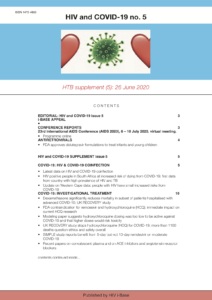HIV and COVID-19: issue 5 (26 June 2020) (HTB no 8)
26 June 2020. Related: Editorial.
 Contents online
Contents online- Download PDF – 1 column
- Subscribe to HTB by email
This edition of HTB includes that the programme is now online for the AIDS 2020 conference that will be held as a virtual meeting from 6 – 10 July 2020. Many of the original satellite meetings are also being held as virtual meetings, including the community HIV cure workshop.
We will report from these meetings in the next issue of HTB.
We also continue coverage of COVID-19, even though the UK is steadily coming out of lockdown (and include the recent BHIVA statement on implications for HIV positive people).
As with previous issues, we start with new research on HIV and COVID-19 coinfection – adding a further eight studies since the previous issue. Although many of these are still small observational cohorts, the data from South Africa is notable for coming from a country with high HIV and TB prevalence, and also for reporting 2-3-fold worse outcomes in HIV positive people.
We also report both positive and negative results from different arms of the UK RECOVERY study. The good news is that dexamethasone significantly reduced 28-day mortality in a subset of people hospitalised with COVID-19 – in those requiring oxygen support, including mechanical ventilation. And a STOP PRESS that this pre-review paper is now online. The negative results though come from reporting no impact of hydroxychloroquine (HCQ).
However, our editorial comments on this study cover the lack of published details on the statistical plan for the study that resulted in so many deaths in the HCQ arm that actually performed worse than no treatment. While recognising the efforts in establishing this important study, we ask whether an alternative statistical approach might have found an earlier answer, given more than 1100 people died (almost 400 people in the HCQ arm and more than 700 people in the control arm).
It is standard to include the statistical details in the online protocol, as the RECOVERY documents also refer to, but yet these are not available, with two of the study arms now stopped. This concern is for the remaining monotherapy groups, given that the aim of RECOVERY was to rapidly switch to better investigational compounds as the study progressed.
Many other studies have now discontinued HCQ arms, including the international WHO SOLIDARITY study.
Further treatment news includes remdesivir, (including a discussion on US pricing and on likely EU approval) and on recent papers on several investigational approaches.

